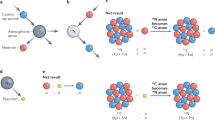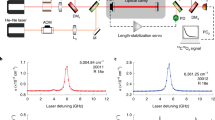Abstract
IN a recent discussion (Phil. Mag., vol. xxxvii., p. 523, 1919) of a number of methods of separating isotopes Prof. Lindemann and Dr. Aston have shown that there is little prospect of effecting by the methods, considered a separation which will yield pure samples of the isotopes in a reasonable time. Dr. Aston has recently announced the discovery that chlorine consists of a mixture of at least two isotopes having atomic weights 35 and 37. It appears that there is here a possibility of effecting a separation of the isotones by a direct method which does not seem to be applicable in the case of most other elements. The method proposed depends on the assumption that in the absorption spectrum of chlorine, which contains avast number of narrow lines, there is a difference between the wave-lengths of the absorption lines due to molecules containing different isotopes.
This is a preview of subscription content, access via your institution
Access options
Subscribe to this journal
Receive 51 print issues and online access
$199.00 per year
only $3.90 per issue
Buy this article
- Purchase on Springer Link
- Instant access to full article PDF
Prices may be subject to local taxes which are calculated during checkout
Similar content being viewed by others
Author information
Authors and Affiliations
Rights and permissions
About this article
Cite this article
MERTON, T., HARTLEY, H. The Separation of Isotopes. Nature 105, 104–105 (1920). https://doi.org/10.1038/105104b0
Issue Date:
DOI: https://doi.org/10.1038/105104b0
This article is cited by
-
Laser isotope separation
Nature (1979)
-
Sulla Isotopia Degli Elementi
Il Nuovo Cimento (1921)
Comments
By submitting a comment you agree to abide by our Terms and Community Guidelines. If you find something abusive or that does not comply with our terms or guidelines please flag it as inappropriate.



